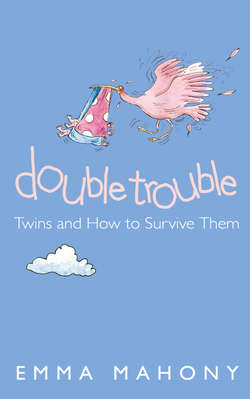Читать книгу Double Trouble: Twins and How to Survive Them - Emma Mahony - Страница 29
What the experts say
ОглавлениеSuzannah Olivier, author of Eating for a Perfect Pregnancy (Simon & Schuster Pocket Books) has the following advice to offer twin mothers:
‘The important thing in any pregnancy, particularly a twin pregnancy, is to eat ‘nutrient dense’ food. Everything provides nutrients, bar sugar, which is empty calories and gives energy without providing nutrients.
‘The other thing is to have more calories than normal. You are going to put on extra weight because of that extra placenta and amniotic fluid. For nutrient-dense food, think of half an avocado rather than extra butter on your bread.
‘Remember, you need these nutrients for yourself as well as the baby in the post-natal stage. To get through those first six months, you need to build up your reserves. You are going to lose a lot of iron, zinc and essential fats in the last trimester and from the birth and the early months of breastfeeding.
‘Food-wise, nuts – tree nuts such as almonds and walnuts – seeds, pulses and oily fish are all good. Zinc is found in any protein-rich food, like red meat.
‘In the third trimester, zinc and essential fats are particularly important for growth. If there’s not enough in the diet the baby will take it from the mother’s reserves (a lot of postnatal depression may be linked in part to the mother’s depletion of zinc and essential fatty acids). Good nutrients also help your own energy levels and stabilize your moods after birth. Often eczema in the mother while breastfeeding is triggered by not having enough essential fats. If you take linseed flax oil, it works very quickly to improve your condition.
‘Two other key nutrients are calcium-rich foods and antioxidant-rich foods, found in fruit and veg. We tend to take a sledgehammer approach to calcium and just drink milk (yoghurt is also good because it is predigested by bacteria), but there are swathes of people who are lactose intolerant. Many people don’t realize that there is plenty of calcium and magnesium in green, leafy veg such as spinach, cabbage, pumpkin seeds, pine nuts and sunflower seeds. Raisins and dried apricots are also unexpected sources of calcium, magnesium, potassium and iron – all needed for bone health.
‘Finally, I would strongly advise every mother pregnant with multiples to take a specially formulated prenatal supplement all through the pregnancy. You can buy them at any chemist, and it’s never too late to start.’
Here is what four triplet (heroine) mothers ate during pregnancy to produce three healthy babies.
‘I ate a lot of toast and Vegemite (my favourite), apples and cheese and lots of red meat (which I found pretty horrible!).’
Susi Gorbey, mother of Abigail, Lucille and Manon, went to 38 weeks with her triplets (‘Don’t let the doctors bully you into delivering early’)
‘I’m a vegetarian, and ate organic food as much as possible during my pregnancy. I ate plenty of fresh foods, but nausea restricted me a lot. I wanted to eat “comfort food”—pies, quiches, potatos, savoury carbohydrates. I avoided caffeine, alcohol, aspartame/phenylalanine as found in fizzy drinks.’
Tracy Alter, mother of Jake, Luke and Daniel
‘I didn’t change much of my diet during pregnancy as we eat a fairly healthy diet in any event. The only change was not drinking alcohol at all and starting every morning with a good breakfast that included flax seed – which I swear kept me extremely well throughout my pregnancy. I didn’t really have a favourite food and didn’t have any cravings.’
Marion Davies, mother of Thomas, Helen and Emma
‘I was either sick or nauseous throughout my entire pregnancy, so ate a lot of whatever didn’t come back up. I steered clear of complex carbohydrates. What I liked best was ice cubes!’
Alex Salmon, mother of Freddy, Lulu and Alexander
